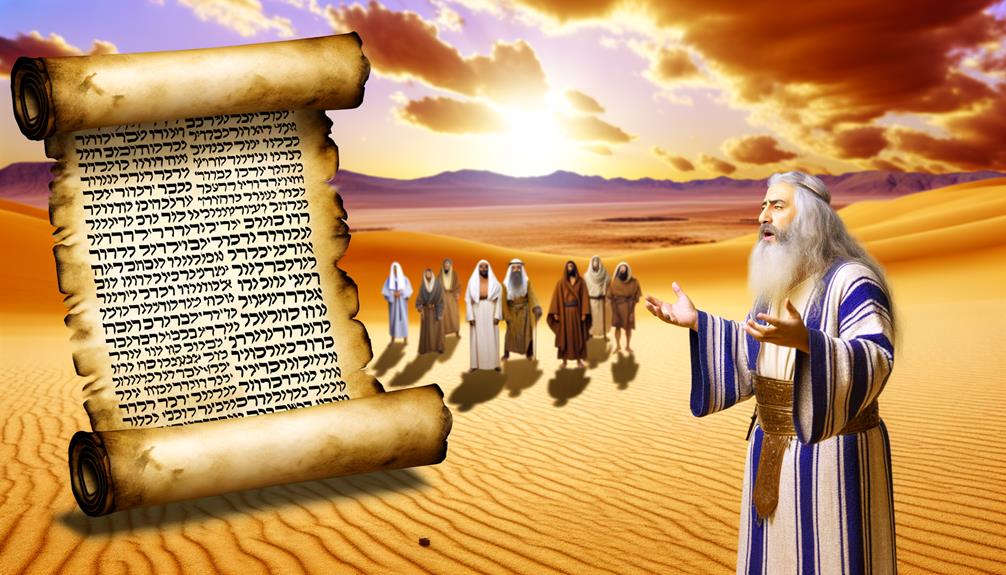Meaning of the Book of Deuteronomy in the Bible: Renewal
The Book of Deuteronomy, attributed to Moses, serves as a theological and historical cornerstone in the Bible, chronicling Israel’s evolution from nomadic life to settlement in the Promised Land. Through Moses’ final sermons, it reiterates covenantal laws and underscores the importance of obedience and communal ethics essential to the Israelites’ divine relationship with Yahweh.
This final book of the Torah sets forth blessings for adherence and curses for disobedience, establishing a unified code of conduct rooted in justice and social equity. Understanding these elements offers deeper insights into its enduring influence on law and ethics.

Understanding the Meaning of the Book of Deuteronomy in the Bible: Themes, Purpose, and Lessons
| Aspect | Details |
|---|---|
| Book Name | Deuteronomy |
| Meaning | Derived from Greek “Deuteronomion,” meaning “Second Law” or “Repetition of the Law” |
| Author | Traditionally attributed to Moses, summarizing his final sermons to the Israelites |
| Date Written | Around the 7th century BCE, with content reflecting events before Israel entered the Promised Land |
| Main Themes | Covenant renewal with God, the importance of obedience, blessings for faithfulness, and warnings against disobedience |
| Key Purpose | To remind the Israelites of God’s laws, prepare them for life in Canaan, and reinforce their identity as God’s chosen people |
| Structure of the Book | 1. Introduction and Historical Review (Ch. 1–4) 2. Reiteration of Laws (Ch. 5–26) 3. Blessings, Curses, and Final Exhortations (Ch. 27–34) |
| Notable Chapters | Deuteronomy 5: The Ten Commandments re-stated; Deuteronomy 6: The Shema (central declaration of faith) |
| Historical Context | Moses’ farewell speeches to the Israelites on the plains of Moab, just before his death and Israel’s entry into Canaan |
| Spiritual Lessons | The call to love God wholeheartedly, the importance of remembering God’s faithfulness, living with integrity, and the consequences of choices |
| Relevance Today | Offers timeless principles on leadership, faith, moral living, and the significance of personal and communal responsibility in honoring God |
Historical Context

The Book of Deuteronomy, traditionally attributed to Moses, is situated within a critical juncture in Israelite history, marking the shift from their 40 years of wandering in the wilderness to their imminent entry into the Promised Land.
This text encapsulates Moses’ final speeches to the Israelites, reiterating the laws and covenantal principles necessary for their societal and spiritual wellbeing.
Historically, this period is pivotal as it represents the culmination of the Exodus narrative and the prelude to the conquest of Canaan.
Theologically, Deuteronomy underscores the importance of obedience to God’s commandments as a prerequisite for divine favor and national prosperity.
Its exhortations aim to fortify the Israelites’ faith and commitment before they settle in a land fraught with new challenges.
Structure and Composition

Deuteronomy’s structure and composition reflect a sophisticated blend of legal code, historical narrative, and theological discourse, meticulously arranged to reinforce the covenantal relationship between God and Israel.
The book is primarily divided into three speeches by Moses, each serving distinct purposes: the first recounts Israel’s journey and God’s faithfulness, the second details the stipulations of the covenant—including laws and commandments, and the third emphasizes the blessings of obedience and the curses of disobedience.
This tripartite structure mirrors ancient Near Eastern treaty forms, underscoring the solemnity of the covenant.
Deuteronomy concludes with Moses’ final acts and death, framing the text within a historical continuum that bridges the wilderness journey and the imminent conquest of Canaan.
Themes of Covenant

Building upon the structured presentation of Moses’ speeches, the themes of covenant in Deuteronomy are central to understanding its theological and historical significance.
The book underscores the bilateral nature of the covenant between Yahweh and Israel, emphasizing mutual obligations and divine promises. Deuteronomy reiterates the Sinai covenant, framing it within the context of obedience and loyalty.
This covenantal framework not only reinforces Israel’s identity as Yahweh’s chosen people but also sets the stage for their future in the Promised Land.
Historically, the emphasis on covenant underscores the continuity of Israel’s religious tradition while addressing the realities of their imminent settlement.
Theologically, it highlights the conditional nature of divine blessings, contingent upon Israel’s adherence to Yahweh’s statutes and decrees.
Laws and Commandments

Central to the Book of Deuteronomy are the detailed laws and commandments that delineate Israel’s religious, social, and ethical responsibilities under the covenant with Yahweh.
These laws cover a broad spectrum, including worship practices, dietary restrictions, civil justice, and social welfare. Historically, they served to unify the Israelite community, establishing a distinct identity grounded in monotheistic worship and ethical behavior.
Theologically, these commandments underscore the reciprocal relationship between Yahweh and Israel, highlighting obedience as a pathway to divine blessing.
Through a reiteration of the Decalogue and the introduction of additional statutes, Deuteronomy reaffirms and expands upon earlier Mosaic Law, ensuring that the covenantal obligations are both thorough and contextually relevant to the Israelites’ lived experience.
Moses’ Final Speeches

Concluding his leadership, Moses’ final speeches in the Book of Deuteronomy serve as a poignant and thorough summation of Israel’s covenantal journey with Yahweh.
These discourses encapsulate theological reflections, historical recapitulations, and legislative reiterations, emphasizing the enduring fidelity required by the Israelites.
Moses revisits significant events, such as the exodus and wilderness wanderings, to underscore the divine acts of salvation and provision.
His speeches also function as a theological bridge, moving Israel from their nomadic existence to settlement in the Promised Land.
By reiterating God’s laws and commandments, Moses aims to fortify the community’s collective identity and fidelity to Yahweh.
These speeches are therefore pivotal, cementing Moses’ legacy and ensuring continuity in Israel’s covenantal relationship with God.
Ethical Teachings

The Book of Deuteronomy encapsulates an extensive framework of ethical teachings that emphasize both laws and moral guidelines, as well as principles of social justice.
These ethical directives are deeply rooted in the theological covenant between God and the Israelites, serving as a foundation for communal life and individual conduct.
Historically, these teachings have greatly influenced Judeo-Christian ethical thought and legal traditions, underscoring an enduring commitment to justice, compassion, and societal well-being.
Laws and Moral Guidelines
In Deuteronomy, the laws and moral guidelines serve as an extensive framework for the ethical conduct expected of the Israelite community. These precepts encompass various aspects of daily life, including religious observance, dietary restrictions, and interpersonal relationships.
Theologically, these laws are seen as a divine covenant, binding the Israelites to God through adherence to His commandments. Historically, Deuteronomy reflects a codified system of law that reiterates and expands upon earlier Mosaic laws found in Exodus and Leviticus.
The ethical teachings emphasize fidelity, justice, and compassion, underscoring the intrinsic link between faith and moral behavior. By adhering to these guidelines, the Israelites are called to a higher standard of living, embodying the principles of holiness and social harmony.
Social Justice Principles
Rooted in Deuteronomy’s ethical teachings, social justice principles emphasize the equitable treatment of all individuals, particularly the marginalized and vulnerable members of society.
These principles, deeply embedded in the historical and theological context of the text, call for a community-oriented approach to justice.
Key elements include:
- Protection of the poor: Laws mandate fair treatment and safeguards for those in poverty.
- Care for widows and orphans: Special provisions guarantee their needs are met.
- Fair labor practices: Workers are granted rights and fair wages.
- Just legal proceedings: Impartiality and fairness are demanded in judicial matters.
These elements underscore a divine blueprint for a just and compassionate society.
Contemporary Relevance

Among the many ancient texts, the Book of Deuteronomy stands out for its enduring impact on contemporary ethical and moral frameworks. Its prescriptions for justice, community welfare, and personal conduct resonate across centuries. The following table highlights key Deuteronomic principles and their modern applications:
| Deuteronomic Principle | Contemporary Application |
|---|---|
| Justice for the Marginalized | Advocacy for social justice |
| Community Responsibility | Civic engagement and volunteerism |
| Moral Integrity | Ethical leadership in governance |
| Economic Fairness | Policies for equitable wealth |
| Environmental Stewardship | Sustainable practices |
This comparative analysis elucidates how ancient mandates continue to inform modern societal structures, emphasizing the timelessness of Deuteronomy’s moral imperatives. By exploring these connections, one gains a deeper appreciation for the text’s relevance in guiding contemporary ethical discourse.
Conclusion
To sum up, Deuteronomy serves as a linchpin in the theological and ethical framework of the Hebrew Bible, encapsulating the covenantal ethos between God and Israel.
Through its historical recounting, legal codes, and Moses’ impassioned orations, the text functions as both a mirror reflecting Israel’s past and a compass guiding its future.
As a treasure trove of divine mandates and moral imperatives, Deuteronomy remains a cornerstone for contemporary religious and ethical discourse.






